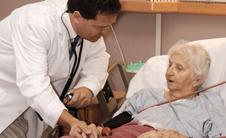Not So Easy to Stop Care When the Patient Is a Loved One
| June 16, 2014

In a painfully honest and moving essay entitled "The Day I Started Lying to Ruth," physician Peter Bach chronicles his gradual evolution from the oncologist who couldn't understand why his patients would continue to seek treatment for a disease that was inevitably fatal:
"Each successive change [of treatment] brings more side effects with less chance of benefit... the cancer gets smarter, the treatments get dumber. Somewhere in this progression the trade-off no longer makes sense... I've often thought that cancer doctors go well past that point."
...to the husband who, along with his wife, grasped at any options made available to them, whether or not they provided a chance for cure:
"None of that mattered to me, the medical professional to whom all these nuances and trade-offs should. All I could think about was the blood test telling us the tumor marker was too high. With that, any dreamy conceit – that patients should be given enough knowledge that they can weigh the risks and benefits for themselves, then come to the choice that best suits them – flew out the window. Our choice wasn't a choice. Take the chemo... I will never again be mystified, as I had been with many patients, by why someone who is at the precipice of death seeks out yet another shot at treatment, even with something harmful that has a near-zero chance of helping. 'Why not?' was suddenly a winning argument."
Bach's story will be all too familiar to those of us who have had a loved one succumb to cancer. For me, it was my sister Fran – a nurse who, like Bach and his wife, was forced to negotiate the frightening choice between the rock and the hard place, always holding out hope for another round of chemo that her doctors said would "treat but not cure" her cancer. We all lied to ourselves, me especially, by not saying the truth. Until it was too late, and then it was over. (God, I miss her...)
What makes Bach's essay even more powerful for me is knowing that he is one of our country's foremost experts in health care effectiveness and, yes, cost. What his essay is telling me is that he understands what cancer patients and their families have known all along – that reining in health care costs will mean more than just raising co-pays and lowering drug costs and funding more effective interventions. It will also mean quashing hope. And learning to tell ourselves the truth.
Curtailing the growing cost of end-of-life care is probably one of the most difficult challenges lying ahead of us. How we face that challenge will define us, both as a profession and as a nation.
Knowing Bach is at the table, I have a feeling we're going to do it right.
This post originally appeared on Margaret's blog, The Blog That Ate Manhattan, on May 8, 2014.










